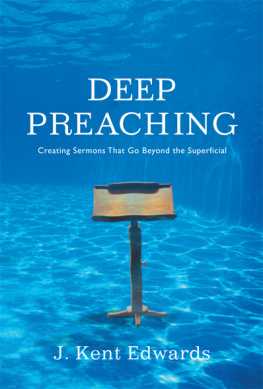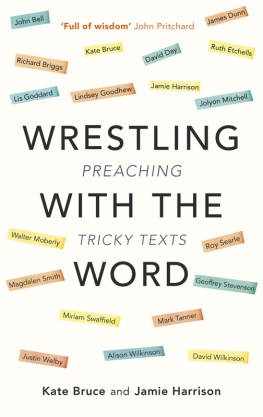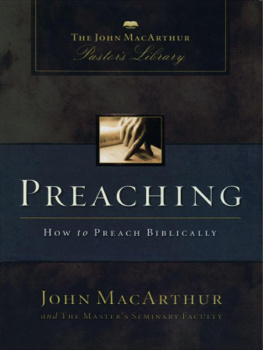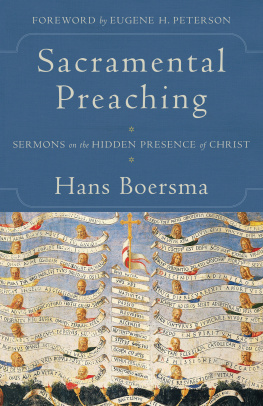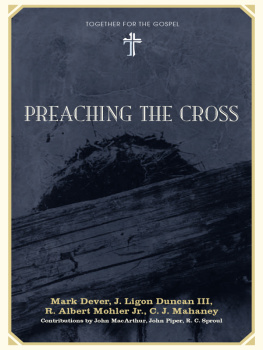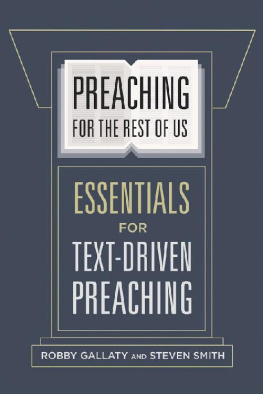Introduction
I n speaking of some well-known fairy tales, Frederick Buechner writes:
In each case, a strange world opens up when it chooses to open up and when they enter it things happen that in the inner world of who they are and the outer world of where they ordinarily live their lives couldnt possibly happen.
In this sentence one discovers the three basic reasons for the existence of this book. First, and primarily, the Bible, like the fairy tales of Cinderella, The Lion, the Witch, and the Wardrobe , The Wizard of Oz , The Lord of the Rings , and a host of others, presents to us a strange world, an extraordinary world, an alternative reality to the one we customarily inhabit. And, like the fairy tales, the Bible presents to us truth, not always or necessarily historical truth, but truth that rings true both to our inner and outer worlds. But more. The Bibles truth is Truth with a capital T. Somehow, even in a postmodern context where truth is relativized by those claiming it, where it is said that there can be no real capital T truths, the Bible reaches out to us and lures us to enter its Truth. We preachers are called to be purveyors of that Truth above all other truths. Our vocation begins and ends in the Bible, however we understand and define and nuance our relationship to it.
By making these claims about the Bibles truth, I do not at all imply that we are biblicists, fundamentalists or literalists. The Bibles truth is not always to be found in its literal details. Indeed, in some of those details can be found much mischief for a twenty-first-century world. Surely, no Christian person would attempt to live by all that the old book says. For example, though Deuteronomy enjoins its readers not to eat the meat of the pig, because it has a divided hoof and does not chew cud (like a cow?) (Deut :), few Christians today (with some exceptions to be sure) would avoid the smell and taste of morning bacon, thinking they would thereby be closer to the will of God. The health issue of cholesterol is for most a far more important truth for bacon avoidance. And more seriously, the public murder by stoning of a rebellious son, who is a glutton and a drunkard who will not obey his parents, is not a practice that should be followed by any rational person today (Deut :). Such food truths and punishment truths can be fixed in their ancient contexts, their rationales argued over by scholars of the text, but to apply them in some sort of literal way in our century would be monstrous.
The second reason for this book articulated by the Buechner quotation is that the Bibles strangeness opens up on the inner world of who we are. In the light of the Bibles alternative reality, our personal realities are illuminated, making possible our own transformations into something more like God had in mind for us from our creation. In countless ways, the biblical story calls for us to examine ourselves in the beams of its searchlight that we might more clearly see who we are and who we can become. Jeremiah calls out that there is no need for us to continue our idolatrous ways, for as we love to say as the Lord lives, our calling on God in this fashion is nothing less than a false swearing (Jer :). One can quickly surmise what the old prophet would say to a twenty-first-century USA that bids God to bless America, while forty-six million of its citizens have no easy access to health care insurance, while nearly percent of its children are hungry each night, and while residents of a Gulf Coast ravaged by monster storms in the late summer of 2005 still wait eagerly for assistance to rebuild their shattered lives. Perhaps two trillion dollars are spent on an unpopular war in Iraq, while an equally unpopular conflict in Afghanistan grinds on. In the face of this outright hypocrisy, Jeremiah, in full alternative mode, promises divine surgery for each of us as our hearts become the tablets on which God will write a divine covenant, a covenant so clear and so lasting that all preachers and teachers will need to look for other work, since all of Gods creatures without exception will at last know God completely (Jer :).
And in a similar manner, but with a slight change of metaphor, the prophet Ezekiel announces that the God of Israel will also perform surgery, but this time will remove all those hearts of stone to be replaced by hearts of flesh, hearts that will finally enable them to follow Gods statutes and ordinances, both of which they have broken with alacrity from their days in the wilderness (Ezek :). Thus both Jeremiah and Ezekiel announce that God will transform the lives of Gods people, lives that they cannot transform on their own, no matter how carefully they give attention to the Dalai Lama or Dr. Phil or Donald Trump. The very claim that we need God to transform us is a very different way to view our lives encased in a world of individualistic entrepreneurship. When the going gets tough, the tough get going, we claim. But in the strange world of the Bible, when the going gets tough, all turn to God for healing and transformation.
The third reason for the book, as enumerated by Buechner, is that the Bible opens out on the world where we live our lives. In fact, the Bible wants to say that there are finally no easy distinctions between our inner worlds that need transformation and the worlds outside us that need transformation, too. Both inner and outer worlds are addressed by the Bible, and the Bible does not demand that either transformation must precede the other. It is often said that we must be personally changed before society can be changed, and there is a certain rationality in that claim. However, the prophet Amos, for example, spends the bulk of his angry words denouncing a society blind to its rotten institutions, blithely living their lives completely unaware of the societal cancer in their midst. His shocking words of : pronounce the divine abhorrence of all of the most treasured ways of worship practiced by the deeply religious Israelites at the sacred shrine of Bethel: their colorful pilgrimage festivals, their eager congregational assemblies, their sumptuous offerings, their fine singing, their choral masterpieces accompanied by well-tuned and well-played instruments. The outer world that they have created is as far from the desires of God as can be imagined. This is no call for inner transformation but a demand for societal change. To be sure, one can hardly exist without the other, but where one starts the transformation is less significant than starting. And where one must start is to listen to the voice of the transforming God.
So, this book is an attempt to offer to preachers a way for them to enter the strange world of the Bible and to help them to present to their hearers the transformational power of that world in such a way that their listeners may hear the power and thereby have an opportunity to hear the unique voice of God. Of course, I do not propose that what I present here will approach the entirety of the Bibles strange world; I have chosen merely a slice of it to examine. That slice is the Hebrew Bibles narratives. Why have I chosen just these special texts? Three reasons are apparent.
Most obviously, they are what I know. My first published book dealt quite briefly with these sorts of texts, offering suggestions about how preachers may approach them for their preaching. Though that book is long out of print, I continue to receive comments from those who have read it and found its words valuable for them. In at least one sense, this book is a sequel to that earlier one, now more than twenty years old. The manuscript I turned in for that 1991 book was far longer than the book that finally appeared. It was thought by its editors that potential readers of that book would not enjoy, nor would they read, the seven detailed examples I offered there for reading and preaching specific texts. I disagreed with that judgment then and I disagree with it still. Hence, you will find in this book several examples left out of that manuscript, albeit updated, along with an example that is for me newer.


